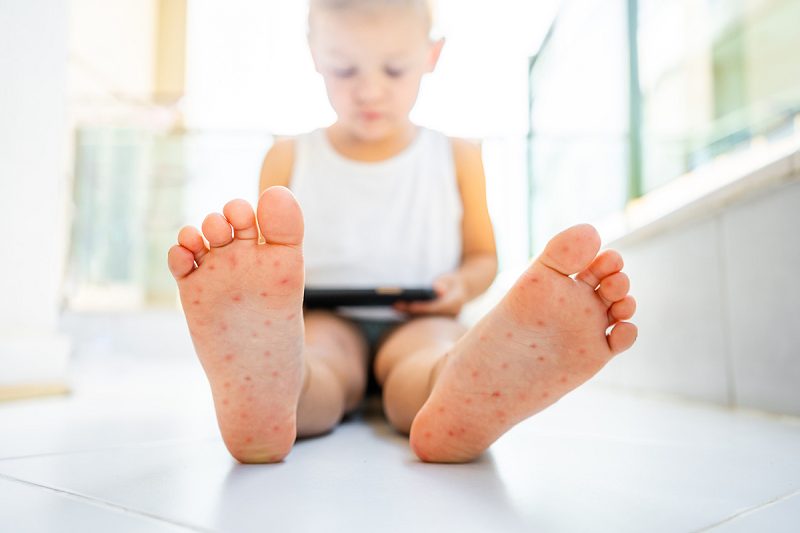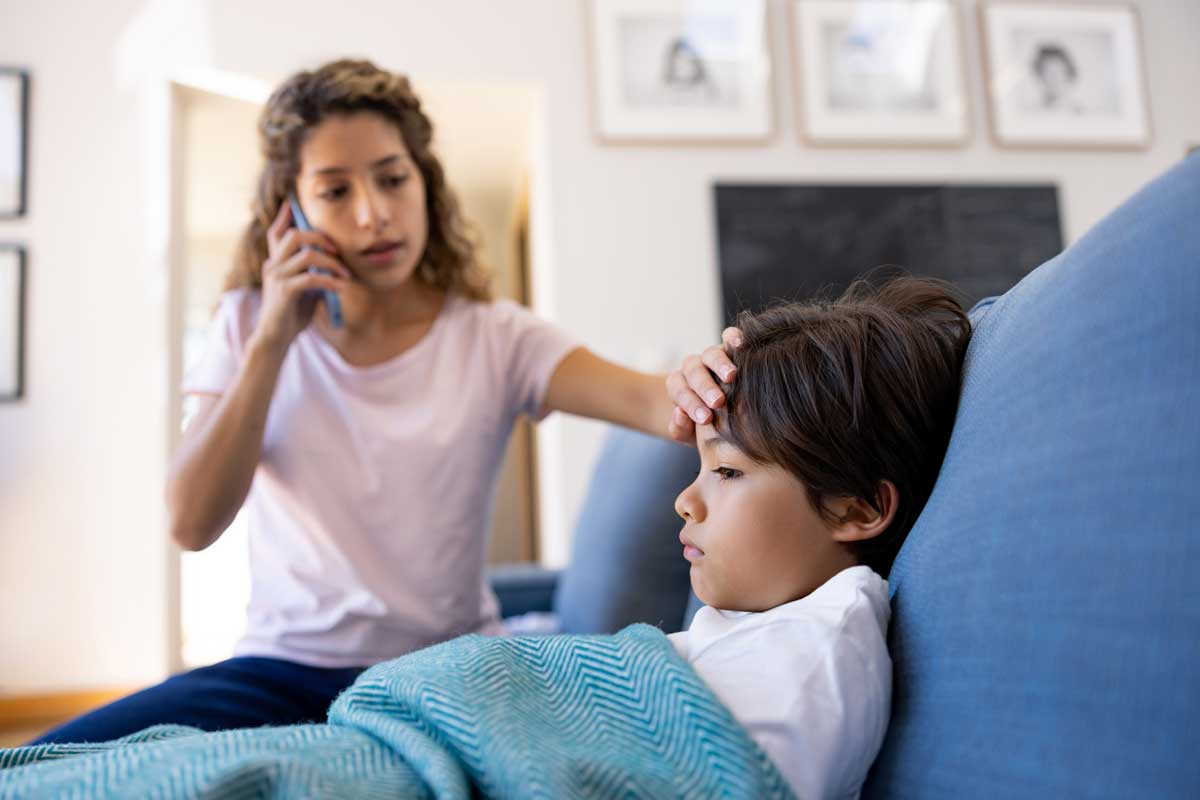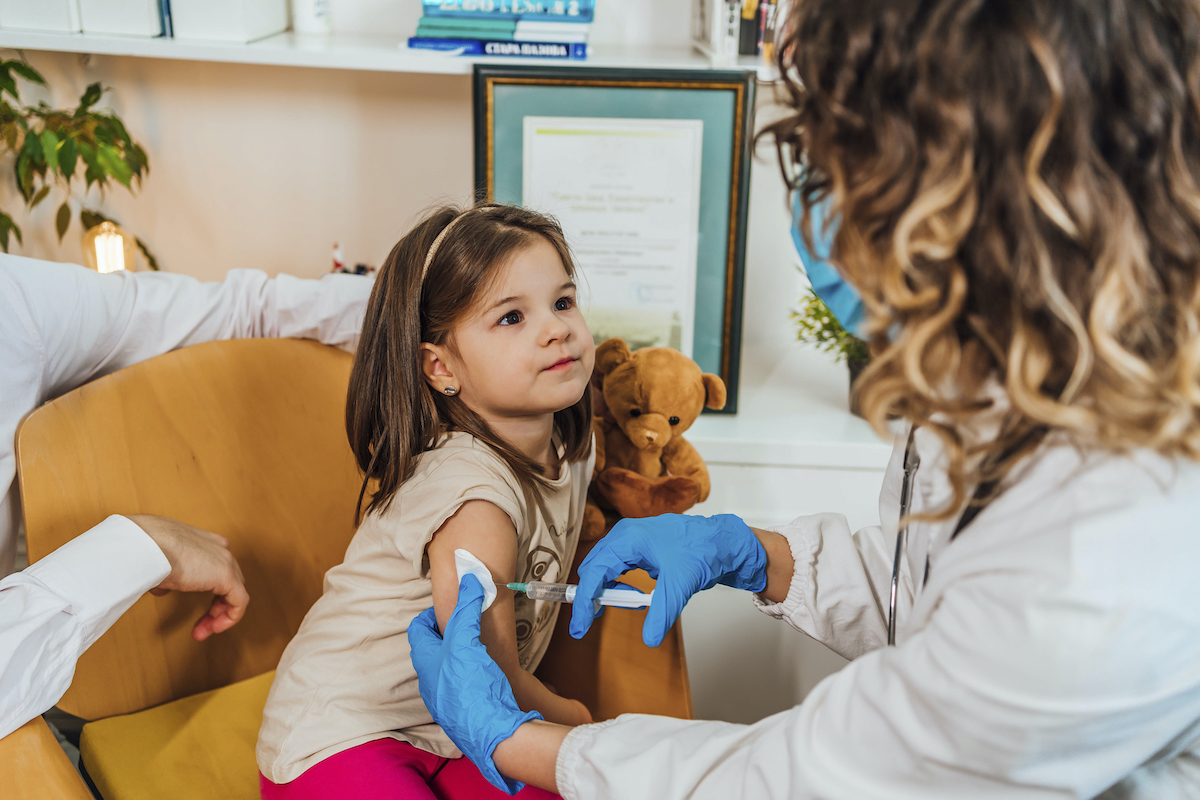If you have small children, you know they are viral vectors (They’re adorable! We love them! But it is the truth). And when your kid does get sick, you need details. What is this illness? How did they get it? Can we avoid them getting it again? How do you treat it? Should I really worry?
Hand, foot, and mouth is, unfortunately, one of these diseases. Here’s a 101 on everything you need to know.

What is hand, foot, and mouth disease?
Hand, foot, and mouth disease (HFMD) describes a set of clinical symptoms: sores and a rash on the tongue and in the mouth, more generally, and on the hands and feet. The mouth sores are easily recognizable. Children often complain of mouth or throat pain or refuse to eat. These symptoms are sometimes, but not always, accompanied by a low fever, fussiness, abdominal pain, and diarrhea.
HFMD is not caused by a single virus. There are at least 15 enterovirus subtypes that cause this set of symptoms. The most common viral causes are coxsackievirus A16 and enterovirus A71. These shouldn’t mean anything to you! That there are multiple viral causes is important to know, though, because it means that (a) kids can get the disease multiple times within a short period and (b) there isn’t a single “test” for HFMD. Diagnosis is based on symptoms; this is unlike, say, COVID, where a rapid test would identify the SARS-CoV-2 virus as a cause.
A note is that some causes of HFMD generate worse disease than others. For example, a disease caused by coxsackievirus A6, which is relatively novel, tends to produce more severe disease, with involvement outside of the typical hand/foot/mouth areas.
How do you treat HFMD?
HFMD, in the vast majority of cases, is a relatively short-lived and mild viral illness. All of the causes are viruses, not bacteria, meaning — more on this below — antibiotic treatment will not help. There is no antiviral treatment (i.e., no Paxlovid equivalent). HFMD typically resolves within seven to 10 days; any non-sore symptoms clear up faster, with sores continuing for longer.
Generally, kids with HFMD should be treated with ibuprofen or acetaminophen for pain. The most significant risk is dehydration, since mouth sores can make drinking difficult. Encouraging kids to continue to drink water, juice, or Pedialyte is essential. A severely dehydrated child could need IV fluids, although that is rare. For a similar reason, children with severe and longer-lasting disease could be at risk for issues like hypoglycemia, simply because they are not eating for longer periods.
Basically, do your best to keep your kid drinking, ideally something with some sugar and calories, until they feel better.
Immunity to the particular virus that causes an episode of HFMD is persistent. This doesn’t mean your child cannot get HFMD multiple times — because of the multiple viruses — but it explains why the disease is most common in babies and young children. Older people are much more likely to have immunity.
(Special note for parents: You might get HFMD from your child. You might not! Generally, your symptoms will be less bad because you’ve likely had it before.)
How can you avoid HFMD?
The main way to avoid getting viral illnesses is washing your hands with soap. These viruses get in because they get on your hands, and you touch your face. So wash your hands. Try to have your kids wash theirs. Hand hygiene — an oldie but a goodie! No, it’s not perfect. But it’s also relatively easy, and it helps prevent many viruses, not just those that cause HFMD.
There is no vaccine for the viruses that cause HFMD available in the U.S. There are several in China, and this is a somewhat active research area. As I noted above, the disease is caused by multiple viruses, so any vaccine that did exist would only protect against one (although it might have some overlap, since the viruses are related). At any rate, there is no vaccine. So it’s really just hand washing.
Do kids have to stay out of child care settings?
As for child care, I have both good and bad news for you.
The good news is that once your child doesn’t have a fever anymore, feels okay, and doesn’t have a lot of open, oozing blisters, the American Academy of Pediatrics says they should be able to go back to school. You do not need to wait until the blisters are all gone. If your child care setting doesn’t adhere to this, you can point them to the AAP advice here.
The bad news, I am afraid, is this, which I will quote directly from the AAP: Exclusion from child care or school will not reduce the spread of hand, foot, and mouth disease because children can spread the virus even if they have no symptoms, and the virus may be present in the stool for weeks after the symptoms are gone.
Put differently: your child could get HFMD anytime, from anyone, even if the other child is not sick and hasn’t been for weeks. I am sorry.
Can this disease be serious? What if I’m pregnant? What about my newborn?
As with any viral illness, HFMD can be more serious. This can happen because of follow-on issues like dehydration, and in rare cases, the viruses that cause HFMD can also cause complications like meningitis or myocarditis. These are all very rare and can happen with many viral illnesses.
Pregnancy: Most adults, including pregnant adults, have been exposed to many of the viruses that cause HFMD. So even if your child gets this while you’re pregnant, there is a good chance you will not. And if you do, that’s unpleasant but typically not dangerous. Enteroviruses are not like CMV — they do not have fetal-specific effects — so it’s just an annoying virus to get over.
The same logic follows if you are trying to conceive — not something to seriously worry about.
Infancy: All illnesses are taken more seriously in a young infant. The same is true with HFMD. You should follow the overall advice: have your toddler wash their hands, do not have them kiss the baby’s face, and so on. But there is no special HFMD fear for your infant in most cases.
Children: There is general advice when you have a kid sick with a virus, which is that you should start to worry and call the doctor only when they don’t seem like themselves, when they seem very sick. When I wrote about norovirus, our pediatrician gave me this quote, also relevant here: “A dehydrated kid or a kid who’s got electrolyte abnormalities looks like a wet dishrag and doesn’t perk up with Tylenol or ibuprofen.” Otherwise, you ride this out like the rest of the many childhood illnesses.
Closing thoughts
It is worth noting that this illness can make kids incredibly uncomfortable and irritable. Forcing your child to drink water so they do not get dehydrated while they have a mouth full of sores is not going to be a parenting high. But the silver lining is that it isn’t a serious illness in nearly all cases, and as soon as their fever goes away, they can go back to child care.
The bottom line
- Generally, kids with HFMD should be treated with ibuprofen or acetaminophen for pain. Encourage your child to drink plenty of fluids so they don’t get dehydrated.
- Parents are less likely to get HFMD from their child because they likely will have built up some immunity to it over their lifetime. (If you do get it, your symptoms will probably be milder.)
- The AAP says that once your child doesn’t have a fever anymore, feels okay, and doesn’t have a lot of open, oozing blisters, they should be able to go back to school. However, people are contagious before they start showing symptoms, so it’s hard to avoid.




















Log in
Glad to see this post! Heads up to parents: there is a variant of Coxsackie which only the throat. I had mysterious and quite painful sores develop on the inside / roof of my mouth then on my throat over a few days. I felt absolutely awful at some points — at least one day all I could do was lay in bed and sleep. Just felt so awful. My doctor was mystified as it didn’t present as HDFM — even called in a colleague of hers to take a look at my throat when went in :). Bloodwork that came back 2 weeks later revealed it was Coxsackie B4. I’ve since met at least one parent who had the same experience so it must happen and thought I’d would pass along. Neither my kids nor my partner were ill. And, it was the most incapacitated I’ve felt as an adult with any kind of virus so I’m all the more impressed with how kids handle it !
This is me currently!!! It’s been awful. The kids also got it but it took me out as if I had the flu. Also had a super high temp (103 with meds).
My husband and I got HFMD from our 11-month old and it was the most sick we have ever been. It lasted for two weeks. Getting it as an adult is not so rare!
Ah the timeliness of this post unfortunately.
Anything about benadryl/mylanta mixtures for mouth sores? What about oragel? Or best treatment of sores in the diaper area? Is there a concern that the open sores will get infected? How long before my kid’s face will look ok again so we quit getting sideways looks when we walk around the neighborhood? Is it a sign of a poorly run daycare if there’s a big outbreak?
And one more question, how long does the virus live on surfaces? I’ve been disinfecting non stop trying to be sure I don’t get it, but my toddler puts his hands and mouth on everything.